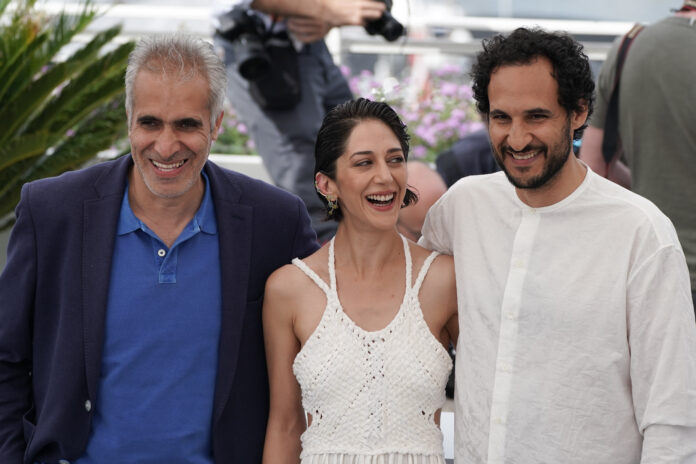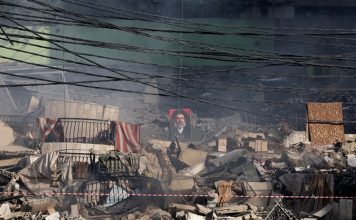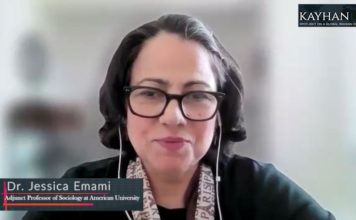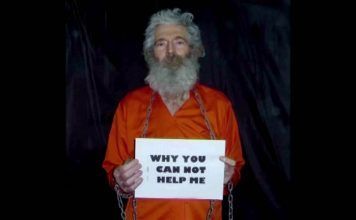
By Ahmad Rafat
Women directors of Iranian descent are seeing their movies widely showcased across European movie theaters. The directors are Zar Amir Ebrahimi, with “Tatami;” Maryam Keshavarz, the Iranian-American director of “The Persian Version;” “Shayda” by the young Iranian-Australian director Noora Niasari; and “My Favorite Cake,” co-directed by Maryam Moghaddam and Behtash Sanaeeha.
All four films revolve around Iranian women and their struggles to secure the rights that have been denied to them by the Islamic Republic for the last 45 years.
Amir Ebrahimi – who won the Best Actress Award at the 2022 Cannes Film Festival for her performance in Ali Abbasi’s “Holy Spider” – is the co-director of “Tatami,” with Israeli filmmaker Guy Nattiv (an Academy Award winner in 2018 for his short movie “Skin”).

“Tatami” is the story of Leila, a female judo champion who enters the World Judo Championships, hoping to win Iran’s first judo gold medal. The Islamic Republic authorities order her to refuse to face her Israeli opponent, using an injury as a pretext. The film mirrors the real-life experience of Iranian athletes who have faced Israeli opponents in international tournaments over the last four decades.
According to the directors, “Tatami” was inspired by the ‘Woman, Life, Freedom’ popular uprising, which began in September 2022, and the resistance of Iranian women. The movie reflects the years of repression faced by athletes who, because they refused to adhere to the regime’s demands, were expelled from their teams or forced to leave Iran permanently.
The protagonist, a judoka named Leila, is confronted with a terrible dilemma: She is instructed to injure herself to avoid facing an athlete from Israel. This decision plunges her into a moral quandary. She must either comply with the demands of the Islamic Republic’s authorities, or go after the gold medal, risking her own safety and that of her family.
Amir Ebrahimi, who portrays Leila’s coach, initially advocates for her withdrawal from the competition, yet she eventually comes to support Leila’s decision.
“What I learned from the Iranian government was that they can harass you if you are afraid. They can arrest you and create many problems for you, but when you are not afraid, you will find your own way, and this is the right way,” Amir Ebrahimi said.
The movie was shot in Tbilisi, the capital of Georgia. The two directors stayed in separate hotels and limited their interactions to ensuring a smooth filming process.
Iranian-Australian filmmaker Niasari marks her directorial debut with “Shayda,” which won the Audience Award in the Sundance Film Festival’s World Cinema Dramatic Competition in 2023.

The film is inspired by Niasari’s childhood experiences and her mother’s brave journey to escape domestic abuse. It follows an Iranian couple as they move to Australia seeking a better life for themselves and their young daughter.
Despite the challenges of emigrating and escaping the life that her husband tries to impose on her, Shayda endeavors to bring moments of joy into her and her daughter’s lives through activities like dancing and preparing for Nowruz, the Persian New Year. By contrast, Shayda’s husband, Hossein, is depicted as a religiously devout, strict, and skeptical individual who resorts to verbal and physical aggression when annoyed. Despite their differences, Shayda remains resilient in creating pockets of happiness for herself and her daughter.
Shayda is portrayed as a voice of reality and honesty, highlighting the plight of Iranian women. She stands out as a character who speaks openly about the challenges faced by women. She addresses the traditional and religious justifications used to validate domestic violence.
Amir Ebrahimi plays Shayda in the film, which represented Australia at this year’s Academy Awards.
“I view this movie as an opportunity for audiences to acknowledge and honor the bravery and perseverance of Iranian women, Australian women, and all women who are actively fighting against domestic violence to attain freedom and independence,” said Niasari, the director of “Shayda.”
“In drawing parallels between the lives of women like Shayda’s mother, this movie echoes the struggles faced by Iranian women during the ‘Woman, Life, Freedom’ movement. Although set in different contexts, it ultimately conveys a sense of transformation within Iran.”
Keshavarz’s “The Persian Version” and Niasari’s “Shayda” are by directors of Iranian descent who were raised outside of Iran, and who draw on their personal experiences to shed light on the complexities of their dual identity. Yet the two movies are also quite different.
In “Shayda,” Niasari delves into the somber narratives of Iranian immigrants, shedding light on their struggles and challenges.
Keshavarz’s “The Persian Version” takes a more lighthearted approach, infusing humor and comedy into the portrayal of immigrant experiences. The film uses a fast-paced narrative and exaggerated comedic elements to engage viewers from start to finish.
The movie begins by claiming to be “based on a true story” but quickly adds a disclaimer of “sort of.”
The film portrays the homosexuality of one family’s grown-up daughter as a personal choice that deviates from the family’s traditional values but is not treated as a major taboo.
The film is a narration of the lives of three generations of Iranian women: grandmother, mother, and daughter.
“The common thread among these three women lies in their resilience and advocacy for their rights, and intriguingly, each of them harbors a secret,” Keshavarz told Kayhan Life. “Women often face greater challenges than men in pursuing their aspirations.”
The movie was shot in Mardin, a village on the Turkey-Syria border, reminiscent of the towns in Iran. Mardin holds UNESCO protection because of its rich history and distinctive architecture.
Winner of the International Federation of Film Critics (FIPRESCI) award at the 74th annual Berlin International Film Festival, “My Favorite Cake” is co-directed by Behtash Sanaeeha and Maryam Moghaddam. The film is an Iranian-French-German-Swedish coproduction and stars veteran Iranian actors Lily Farhadpour and Esmail Mehrabi. It tells the story of a 70-year-old woman who courageously pursues her dreams in a country that severely curtails women’s rights.

The film is a captivating illustration of Iran’s underground cinema, which has experienced significant growth over the past two years, boldly defying the constraints imposed by the Islamic Republic over the last four and a half decades, and offering audiences a fresh perspective on Iranian cinema, its people, and its society.
In “My Favorite Cake,” the characters live in present-day Tehran without adhering to the mandatory hijab rules – adopting a lifestyle that is completely taboo in terms of cinematic representation in the Islamic Republic of Iran. It reflects the everyday interactions and behaviors that ordinary citizens experience. In the film, characters of both genders shake hands, hug each other, and drink wine on joyous occasions.
The movie shows a mature couple who refuse to let go of love despite their advancing age. In a pivotal scene, the female protagonist intervenes when she witnesses the Morality Police attempting to take a girl away forcibly. She bravely stands up to the officers and saves the girl by appealing to the officer’s humanity. Despite being physically pushed by the officer, she uses words as her only weapon, appealing to the officer’s memories of his own mother.
The film is one of the first love stories in post-revolutionary Iran, capturing a poignant moment when a man and a woman engage in a dance and share wine in an intimate setting. The scenes of wine drinking in the garden are visually captivating, and carry profound narrative significance. The love story unfolds tragically, culminating in a sorrowful ending where the woman must bury her dreams and aspirations within the confines of the same garden.













